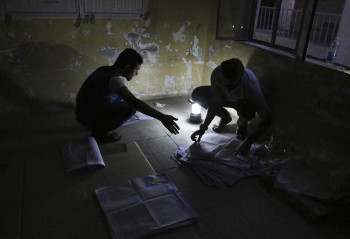
Iraqi academics said they were pessimistic about their future security and the prospects of higher-education development and academic freedom as they went to the polls this week in the country’s first parliamentary elections since American troops departed in 2011.
Long accustomed to being targets in war-torn Iraq, academics said an escalation in attacks and sectarian strife throughout the country would increase their exposure to danger and the situation will likely get worse.
“Certainly the violence rates will escalate,” said Zainab Zwain, a professor of medicine at Erbil University, in the relatively peaceful, semiautonomous northern province of Kurdistan. “The ones taking hold of Iraq are those promoting sectarianism. They will set off bombs and, as usual, ordinary people will be the victims.”
Zwain’s fears are in line with the findings of the Brussels Tribunal, a left-leaning Belgian think tank that estimates that 400 academics have been killed in Iraq since Saddam Hussein’s regime collapsed in 2003. Around 20,000 Iraqi academics have fled the country amid bombings, assaults, harassment, ransacked faculty offices and other hardships, the group said.
Early last year, it appeared as if violence against academics in Iraq was subsiding. But in the run-up to the elections, sectarian groups have become more active and violence has escalated to a point not seen since 2006 when the country was nearly plunged into total chaos. Almost 4,000 Iraqis have been killed in 2014 alone, according to Iraq Body Count, a UK-based watchdog group.
Much of the violence stems from discontent among the Sunni minority who feel marginalized. The citizenry has also grown fearful that Shiite Prime Minister Nouri Al-Maliki’s corrupt regime has struck deals between armed groups but that those deals have not prevented bloodshed.
“This election is a crucial issue for Al-Maliki,” said Nabeel Murtadha, a retired chemistry professor and researcher at the Scientific Research Council in Baghdad. “He won the last election because of improvements in security. Now and through the last four years, he gave nothing but support to the militias. I think Al-Maliki’s win will lead Iraq to the unknown, a civil war or division because he has nobody supporting him right now. Even some of the major Shiite clerics have asked people not to vote for him.”
In the dangerous climate, fighters frequently single out academics who often are outspoken leaders in their communities and associated with institutions affiliated with factions in Iraqi’s fragmented society.
Last week, militants attacked Imam Kadhim University, a private Shiite institution in Baghdad, killing five in an incident observers said was an attempt to fan sectarian conflict before the polls opened.
At many universities around the country, faculty members say that an undercurrent of fear permeates campuses and academics have to be extremely careful over what they say and publish. Many don’t expect that to change with this vote.
Isam Al-Samarra’i, who until recently was a professor of art at the Academy of Fine Arts in Baghdad said he didn’t vote Wednesday because the elections won’t make a difference.
“I want to emphasize that not voting in 2010 or now doesn’t have anything to do with ideological or political affiliation,” he said. “The reason is, simply nothing has changed, neither in political life nor in our political leadership. The deteriorating security situation remains and political tyranny is rising—all this has turned Iraq into a place where destruction and suffering prosper.”
“This election is important for many countries in the region,” added Al-Samarra’i. “But all these regional interests are not concentrating on finding real solutions for Iraq’s situation…(as a result), nothing will change or enhance our education system because Iraqi politicians are too busy stealing Iraq’s wealth.”
While dispirited, some academics hold on to hope, yearning for the stability necessary to improve institutions of higher learning that were once considered among the best in the Middle East.
“To believe in change is harder than the change itself,” said Omar Jasim Mohammed, a lecturer of history at Al-Imam Al-Adham University in Mosul.
Mohammed said he tried to remain positive if only because the alternative—a slide into even worse violence—was unthinkable.
“Today, I went to the elections full of hope that we can change,” he said, noting that he hasn’t voted in the past election because he didn’t trust the candidates. “The need for a modern education system is not merely a necessity but a cornerstone without which Iraq can never rise.”
He added that he hoped secular Iraqi politicians running for office—who are often associated with universities—would gain in the polls in order to counteract the power of religious groups that wanted to undermine intellectual inquiry.
“Secular education is essential to develop our students to feel free to discuss whatever they want without interference of religious institutions that are trying to prohibit certain fields of education,” he said.
AddThis Sharing ButtonsShare to FacebookShare to TwitterShare to Email






